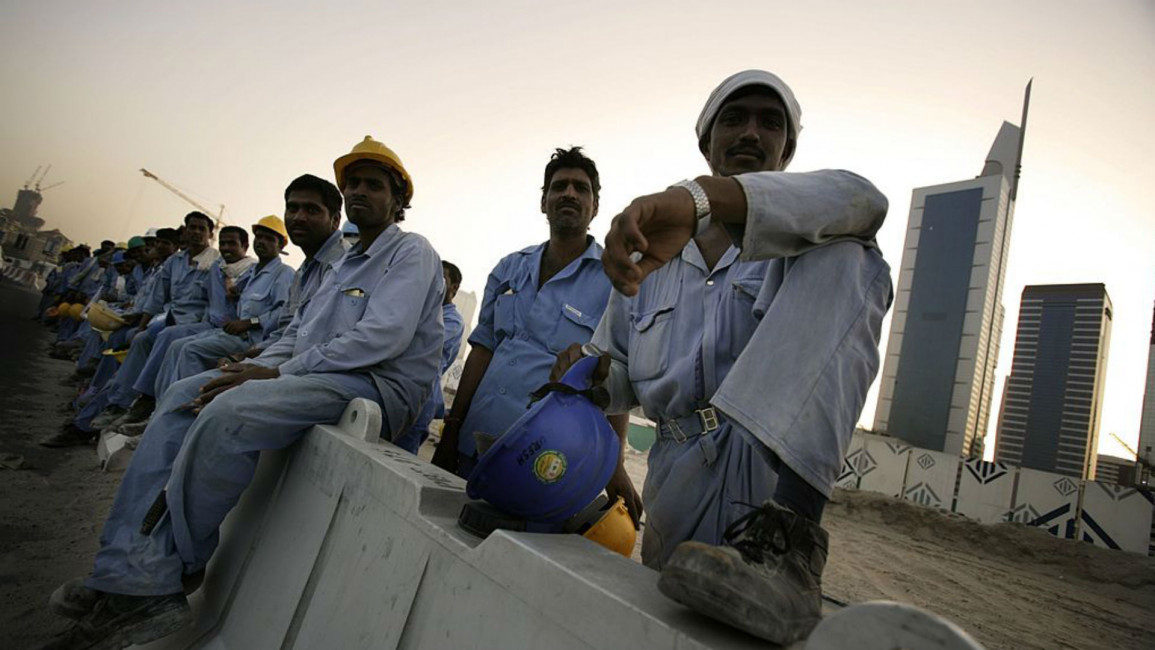
Can Gulf countries survive without their foreign workers post-pandemic?
It is therefore unsurprising that, in some countries of the Gulf Cooperation Council (GCC) which house expatriate majorities and/or rely heavily on foreign labour, the question of the future status of these expatriates is increasingly being raised.
The issue of expatriate workers in the GCC, and concerns about overreliance on them, is by no means new.
Indeed, the policy of "Saudisation" - an attempt to nationalise Saudi Arabia's workforce, began as early as the 1980s. After the 2014 oil price collapse, there was widespread discussion about the increasingly urgent need to implement austerity measures throughout the GCC, including weaning nationals off of the public sector jobs on which many of them depend, to aid these states' diversification away from hydrocarbon resources.
In response, many nationals have posited that the costs need not fall on citizens; instead, in their view, removing expatriates from their countries or extracting taxes from them would obviate the need for cutbacks among citizen populations.
As Kuwaiti MP Safa al-Hashem famously put it, expatriates should "pay even for the air they breathe." With the introduction of Golden Visa projects in the last year, it has become increasingly clear that the expatriates who are most welcome in the GCC today are those willing to invest.
 |
The expatriates who are most welcome in the GCC today are those willing to invest |  |
As a result, employment of national populations is being very carefully guarded. Last week, Oman week ordered state companies to speed up their 'Omanisation' by hiring more Omanis and laying off foreign staff, particularly in managerial positions. Meanwhile in Saudi Arabia, which has an unemployment rate of 12 percent, authorities have asked all foreign residents to register online so they can facilitate repatriation under the "Awda" initiative.
The kingdom has already slashed private sector salaries by 40 percent. In Bahrain, several MPs have tabled draft legislation that would grant Bahraini nationals priority in getting jobs in private educational institutions.
Twitter Post
|
And in Kuwait, several parliamentarians last Wednesday warned the government that they would obstruct passage of a draft law that would allow private firms to decrease salaries of nationals.
Even outside the Gulf, Jordan has perhaps been the bluntest in its messaging, giving the approximately 800,000 migrant workers a deadline to leave the country and specifying that post-COVID 19 jobs will be for "Jordanians first." Even before the current crisis, Jordan, like its GCC neighbours, was attempting to wean itself off dependence on foreign labour, particularly given that unemployment among Jordanians was estimated at some 19 percent before the pandemic.
Kuwait police disperse 'riot' by Egyptian workers stranded by virus
Now it seems that some expatriates are hoping to leave on their own, with projects increasingly being stalled and payments delayed. Last Sunday, Kuwaiti police dispersed what was described by Kuwait News Agency as a "riot" of Egyptians in a migrant camp hoping to return home in the midst of the Covid-19 pandemic.
Egypt began on Wednesday offering repatriation flights to Egyptian nationals. India is also said to begin offering the same, but potentially at the cost of those traveling. Two flights from Dubai to India departed on Thursday. It is unsure whether those expatriates will choose to return.
Even if we view expatriates as solely economic assets or threats, which of course denies their cultural and social contributions, expatriate flight from the Gulf is problematic – not least because they provide much cheaper labour than nationals and much-needed remittances to their home countries.
They have also played a major role in sustaining GCC airlines, service industries, real estate, and growing entertainment sectors in which states have invested heavily. Without expatriates to soften the economic blow of future economic dips, fighting could turn inward, and blame could be placed increasingly on government policies rather than on "outsider" populations.
 |
Even before the current crisis, Jordan, like its GCC neighbours, was attempting to wean itself off dependence on foreign labour |  |
Further, in Qatar, for example, which has only around 300,000 citizens, expatriate labour is a demographic reality. Interestingly, it is only in Qatar, where we have not seen the same torrent of anti-expatriate statements or attempts to nationalise the workforce with increasing urgency.
Still, with stories about shortages of food in labour camps surfacing this week, it is clear that migrant workers face a variety of challenges, and it remains to be seen whether they will choose to continue to face them.
Dr Courtney Freer is a research fellow at LSE Middle East Centre.
Follow her on Twitter: @CourtneyFreer
Opinions expressed in this article remain those of the author and do not necessarily represent those of The New Arab, its editorial board or staff.


![President Pezeshkian has denounced Israel's attacks on Lebanon [Getty]](/sites/default/files/styles/image_684x385/public/2173482924.jpeg?h=a5f2f23a&itok=q3evVtko)



 Follow the Middle East's top stories in English at The New Arab on Google News
Follow the Middle East's top stories in English at The New Arab on Google News


